Opinion

Meritocracy fails to give communities of color the comforts and privileges of mediocrity.
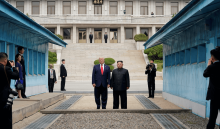
Today, the space to negotiate peace on the peninsula remains accessible as both Koreas and the United States are not only aiming for peace and denuclearization, but on genuine economic cooperation.

Who are the lamplighters of our time, the ones lighting the dark paths we are journeying? What do they have to teach us about keeping up hope?

Trump’s latest executive order is yet another chapter in the spiritual story created by evangelicals.

The scriptures assigned to the church during these days of hopeful waiting are filled with warnings against unjust rulers. This is repeated frequently in the Psalms, in the voice of one crying in the wilderness, and in the prayerful praise offered by Mary. The Magnificat, whose words are sung and prayed hundreds of thousands of times during these days, speak forcefully about the demise of the proud and conceited — and rulers who act like tyrants.

That damage of war has been put on full display in films before, leaving many audiences wondering about the purpose of war films. Many films often placed strictly into the categories of being anti-war or glorifying war but 1917 evades easily falling into either category. When addressing this categorization, screenwriter Krysty Wilson-Caines made sure to note that she had no desire to glorify war.

Trump's executive order undermines the freedom of Jewish self-definition.
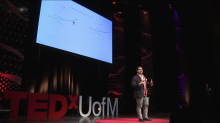
Abdul El-Sayed, a Michigan-born American of Egyptian descent who, last year, very nearly became the first Muslim governor in U.S. history. Abdul is a professor and medical doctor turned politician and civil servant, who has a fantastic new podcast with on public health called America Dissected. Additionally, his new book, Healing Politics, will be out on May 5, 2020 and is now available for pre-order.

As a historian who has spent a career studying pregnancy and birth, I always look forward to Advent. During the weeks leading up to Christmas, the scripture passages read aloud in Christian churches feature not just one, but two stories of miraculous pregnancies that end in safe and happy births. The more famous, of course, is the story of Mary’s pregnancy with Jesus.

An explosive report was published on Monday afternoon in the Washington Post, based on the Post’s review of thousands of pages of interviews with people who played a direct role in the war, all previously unreleased until the paper recently won a multi-year court case on Freedom of Information Act grounds. And the report only gets more damning as it goes on.
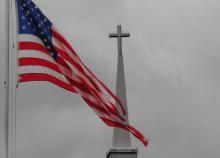
Partisans use Romans 13 to baptize their politics as being “ordained by God.” But Christians who reference Romans 13 typically do so using an us vs. government relationship. But unlike the first century when Roman rulers were mainly determined by heredity, lineage, or brute force, today we are the government. There is no us vs. them because we play an active role in how our government works and is run.
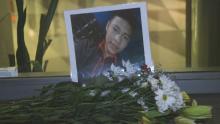
Too often, we discuss immigration as if migrants were objects, not subjects in their own journey. Individual stories disappear into the rhetoric of “tens of thousands,” retreating into statistics’ deadening numb. Lost, too, is the depth of migrants’ faith; the courage to sojourn as a stranger in unknown lands, fueled by longing for a loving future.

Charlotte Clymer is an activist, writer, and Twitter savant. She’s a veteran who served with the U.S. Army from 2005 to 2012, and she serves currently as the press secretary for the Human Rights Campaign, an LGBTQ civil rights organization. Charlotte is one of the most prominent trans activists in the country, and I wanted to learn more about how her personal experiences with poverty, the U.S. military, and being transgender have shaped the person she has become today. I’ve learned so much through our friendship over the years, and I’ve learned even more in this conversation about the challenges she’s encountered, and how and why she remains active in seeking justice and civil rights for all.

Mysterious people with political connections arrived from a country off in the East. They brought news the ruler did not like. There was a new claim to the throne. An effort was underway to remove him and install another ruler. King Herod wanted to dismiss the claims as “fake news” and a “hoax” — not because the intelligence report was inaccurate, but simply because he didn’t like the news. These Magi, after all, had done their research.

There’s a difference between having a strong faith and being religiously obsessed, and religion can definitely be an addiction — in my view it becomes an addiction when it interferes with the rest of a person’s life, when following it means hurting oneself, or hurting other people. For me, I re-invented myself entirely in the wake of my conversion.
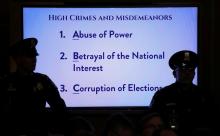
Advent began on Sunday and will continue until Christmas. In Advent, we are to turn our thoughts to the meaning of Christ’s coming and the deep significance of the season for followers of Jesus. I would go so far as to say that Advent and then Christmas are my favorite liturgical seasons because they demand that we do the work to prepare our hearts to answer this question: What does it truly mean that God came and lived as one of us in our world to show us God’s way? The incarnation was the beginning of the Jesus movement to change the world.
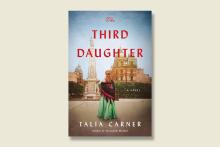
Compassion. Curiosity. Courage. To author Talia Carner, a writer needs these three qualities to tell a good story — and they are on full display in Carner’s latest historical novel, The Third Daughter. Based on “The Man from Argentina,” and the tales of Tevye the Dairyman and his daughters by Yiddish writer Sholem Aleichem, the book tells the story of the hundreds of Jewish girls from Eastern Europe who were trafficked by the Jewish pimps union, Zwi Migdal, and brought to Argentina and Brazil in the late 19th and early 20th century.

A door closing tight, shutting out an image of a man sitting on an elegant chair, taking the hand of a subordinate: a firm instruction to keep out. Another door half-open, behind which another man in physical decline sits, alone and afraid of the dark. Two cinematic perspectives on two doors. The first forms the conclusion of Francis Coppola's The Godfather, as Michael Corleone is effectively enthroned as a demonic king. The other may become comparably iconic, as Martin Scorsese's The Irishman’s Philadelphia mobster Frank Sheeran does the most he can to feel regret, to feel anything, after a life of theft, killing, and nihilism masquerading as protecting the ones he loves.

The Religious Right was not wrong to tell people of faith that the Bible is political. Its critical mistake and enduring sin is not that it challenged Christians to engage in public life, but that it invited us to join a reactionary coalition driven by racial fear, male chauvinism, and corporate greed. Decent people with sincere motives joined the Moral Majority and the Christian Coalition to put their faith into practice. But these organizations made fallible people worse than we would have been otherwise. They led us astray.
